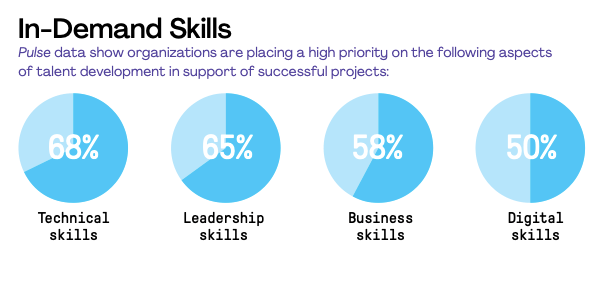
Is tech a threat to the future of the project profession?
Updated on Tuesday, 23rd August 2022 15:24
Technology is disrupting the project profession at rapid speed. It is revolutionising business and transforming operations. In various industries staff have been replaced by robots, and tech advancements have resulted in job losses. Is it only a matter of time before the project profession suffers too? As automation becomes more intelligent, and AI increasingly has the ability to make decisions using big data and smarter algorithms, are we next in line to be taken over by tech?
Technology can boost productivity and improve efficiency, but does so by reducing the number of employees needed to generate the same or even higher levels of production. [Source]
So, is technology a threat to our project profession? The counter argument of course is that Industry 4.0 will open doors for future careers, and that job gains and losses will even out. Yes, our roles will be transformed, even revolutionised, but even in the digital world humans will still be needed to project manage.
Bracing ourselves for tech
Disruptive technology can be perceived to threaten the profession, but by bracing ourselves for new developments in project management, and in wider business, we can be far better equipped to ride out and even embrace the change. By coming to expect tech innovation we can equip ourselves to be ready for a future which advances at a rapid pace.
‘Choosing the right technologies to invest in’ was found to be one of the top factors leaders identified for achieving success. PMI’s 2020 Pulse of the Profession report spoke with executives at top organisations who also listed ‘organisational agility’ and ‘securing relevant skills’ as their most important factors.
The skills which organisations were found to prioritise echoed those listed to be important factors for achieving success – a focus on change, tech and development:

Project professionals who are struggling to meet these in-demand skills may struggle to execute projects successfully in the future. Forward-thinking organisations are investing in tech, re-imagining their vision, and adopting new ways of working. And so, project managers must look to advance proficiencies which allow them to thrive in Industry 4.0.
Unlocking our potential
In terms of change management, organisations are recognising the harsh reality of having to keep up or risk being left behind; and the same goes for project managers. Developing talents will unlock our potential. Whether that means expanding our tech and digital skills, working on our business/leadership acumen, or building on our soft skills.
The digital revolution is set to make soft skills ever more important. The focus will shift from traditional project skills such as planning, scheduling and resource management, to one which values problem solving, creative thinking, empathy and understanding. Essentially the ‘human touch’, which we can still use to outperform machines (for now).
Future-fit project professionals will need to be agile in their approach. An ability to think on your feet will make change a constant and allow you to progress. Pair this with a strong understanding of human behaviour and you have a futureproof recipe for leadership success. Soft skills such as people skills will have a vast impact on how projects are run. Technology is only as smart as the people behind it and so project leaders must have the training, understanding, processes and talent in place to utilise tech to their advantage.
Harnessing disruptive technologies
In their report, Pulse also asked senior executives what area they expect to make the most considerable investments in over the next three to five years. The top responses were technology advancements - 49%, and digitalization - 44%. With these figures in mind we must be sure to also invest the time and resources for reskilling and retraining.
Not only can upskilling allow us to keep up in the digital age, but also get ahead. Finding a way to harness technology means it can be used to the project’s advantage. What’s more, organisational change is often fueled by shifts in technology. Ensure you have the talent and knowhow to utilise tech as it has the power to drive progression and turn ideas into reality.
Reskilling ourselves and our teams will help to shape a company culture which is receptive to change. It will minimise tech disruption and make implementation much smoother. Digital skills are no longer perceived as an added benefit. The future-fit project professional is tech fluent and equipped with strong people skills.










 English
English
 Duits
Duits
 Nederlands
Nederlands
 Pools
Pools